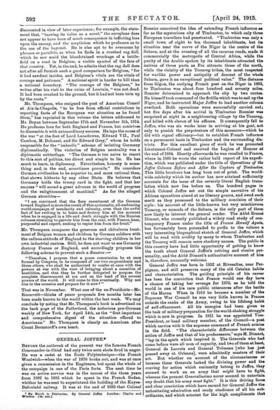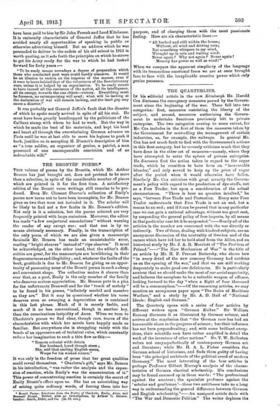GENERAL JOFFRE.•
BEFORZ the outbreak of the present war the famous French Commander-in-Chief had only twice seen shots fired in anger. Be was a cadet at the Boole Polyteobnique—the French Woolwich—when the war of 1870 broke out, and was at once given a commission in the Engineers, but spent the whole of the campaign in one of the Paris forts. The next time he was on native service was in the course of the three years from 1892 to 1895 which he spent in the French Sudan, whither be was sent to superintend the building of the Hayes- Befonlabh railway. It was at the end of 1893 that Colonel • Mr March to Tiontnsetoo. By General Joffe.. London Matto and
12s. wk.] •
Bonnier conceived the idea of extending French influence Oa far as the mysterious city of Timbuctoo, to which only three European travellers had penetrated. "Timbuctoo was only a small town of eight to ten thousand inhabitants, but its situation near the curve of the Niger in the centre of the Sahara, and at the crossing of all the caravan roads, made it commercially the metropolis of Central Africa, while the purity of the Arabic spoken by its inhabitants attracted the natives of those parte as Fez attracts those of the north, while the vicinity of the Touareg tribes, the most respected for warlike power and antiquity of descent of the whole Sahara, gave it an exceptional political value." The distance from Segon, the outlying French poet on the Niger in 1893, to Timbuctoo was about four hundred and seventy miles. Bonnier determined to approach the city by two routes. He himself took command of the flotilla which was to sail up the Niger, and he instructed Major Joffre to lead another column overland. Both operations were successfully carried out; but five days after his arrival in Timbuctoo Bonnier was surprised at night in a neighbouring village by the Tonareg, and killed with eleven of his officers. It consequently fell to Joffre, who was six weeks later in arriving at his goal, not only to punish the perpetrators of this massacre—which he did with signal efficiency—but to establish French influence on a permanent basis in Timbnctoo and the surrounding dis- tricts. For this excellent piece of work he was promoted Lieutenant-Colonel and received the Legion of Honour at the end of 1894. Shortly afterwards he was recalled to France, where in 1895 he wrote the rather bald report of his expedi- tion, which was published under the title of Operations of the Joire Column Before and After the Capture of Timbuctoe. This little brochure has long been out of print The world- wide celebrity which its author has now attained sufficiently accounts for the issue of the severely literal English trans- lation which now lies before us. The hundred pages in which Colonel Joffre set out the simple narrative of his African operations aimed at no literary graces, and owed such merit as they possessed to the military concision of their style : his account of the little-known but very mischievous Touareg, or nomads of the Sahara, is the only part of them now likely to interest the general reader. The Abbe Ernest Dimnet, who recently published a widely read study of con- temporary France under the title of France Herself Again, has fortunately been persuaded to prefix to the volume a very interesting biographical sketch of General Joffre, which will be read with avidity by many to whom Timbuctoo and the Touareg will remain mere shadowy names. The public in this country have had little opportunity of getting to know the truth about General Joffre'e retiring and elusive per- sonality, and the Abbe Dimnet's authoritative account of him is, therefore, unusually welcome.
General Joffre was born in 1852 at Riveealtee, near Per- pignan, and still preserves many of the old Catalan habits and characteristics. The guiding principle of his career has been the conviction that France would one day base a chance of taking her revenge for 1870, as he told the world in one of his rare public utterances after the battle of the Marne. When in 1910 he became a member of the Supreme War Council he was very little known in France outside the ranks of the Army, owing to his lifelong habit of self-effacement. All his energies had been given to the task of military preparation for the world-shaking straggle which is now in progress. In 1911 he was appointed Vice- President, or bead military member, of the Council—a post which carries with it the supreme command of French armies in the field. "The characteristic difference between the action of Joffre and that of his predecessors." says M. Dimnet, "lay in the spirit which inspired it. The Generals who had come before were all men of capacity, and two of them at least, General de Lacroix and General Tremean [who has just passed away at Orleans], were admittedly masters of their art. But whether on account of the circumstances or because these Generale lacked the divining power and the craving for action which eminently belong to Joffre, they seemed to work on an army that might have to fight, whereas the present Generalissimo never seemed to entertain any doubt that his army must fight." It is this driving force and clear conviction which have earned for General Joffre the unhesitating admiration and ready obedience of all his sub. oftlinates, and Which account for the high compliments that
have been paid to him by Sir John French and Lord Kitchener. It is eminently characteristic of General Joffre that lie has avoided nearly all opportunities of speaking in public or otherwise advertising himself. But an address which he was persuaded to deliver to the cadets of his old school in 1913 is worth quoting, as it sets forth the principles on which he strove to get his Army ready for the war to which be had looked forward for forty years
"To be ready means nowadays a degree of preparation which therm who conducted past wars could hardly conceive. It would be an illusion to reckon on the impetus of the masses, even if it were to leave behind that of the volunteers of the Revolutionat7 wars, unless it is helped by an organisation. To be ready means to have turned all the resources of the nation, all its intelligence. all its energy, towards the one object—victory. Everything mast be foreseen, no extemporising will avail ; what will be lacking at the declaration of war will remain lacking, and the least gap may cause a disaster."
It was probably not General Jeffre's fault that the disaster of which he spoke nearly arrived in spite of all his zeal. He must have been greatly handicapped by the politicians of the Caillaux stamp with whom be had to work. But the way in which he made the beat of his materials, and kept his head and heart all through the overwhelming German advance on Paris until he was at last able to move his legions to push it back, justifies us in accepting M. Dimnees description of him as " a true soldier, an organizer of genius, a patriot, a man possessed of one unconquerable conviction and of an indomitable wilL"















































 Previous page
Previous page